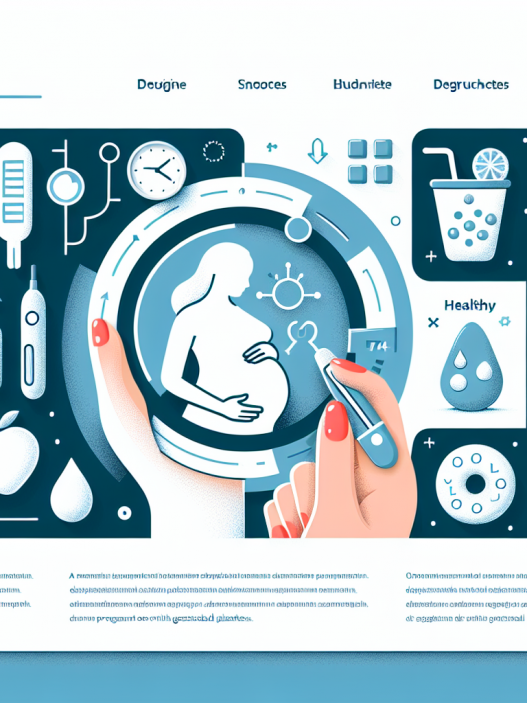[ad_1]
<!DOCTYPE html>
<html lang="en">
<head>
<meta charset="UTF-8">
<meta name="viewport" content="width=device-width, initial-scale=1.0">
<meta name="description" content="Debunking myths and misconceptions about gestational diabetes to provide clarity and support for expectant mothers.">
<title>Gestational Diabetes: Debunking Myths and Misconceptions</title>
</head>
<body>
<h1>Gestational Diabetes: Debunking Myths and Misconceptions</h1>
<p>Gestational diabetes is a condition that affects many pregnant women, and while it's increasingly recognized, numerous myths and misconceptions surround it. This blog aims to shed light on what gestational diabetes really is, its causes, management strategies, and the truth behind common myths. Understanding these facts is vital not only for expectant mothers but also for their families and health care providers to ensure a healthy pregnancy journey.</p>
<h2>Understanding Gestational Diabetes: What You Need to Know</h2>
<p>Gestational diabetes is a type of diabetes that occurs during pregnancy. It typically develops around the 24th week gestation and affects how your cells utilize sugar. While the root cause of this condition can vary, it often arises due to hormonal changes that lead to insulin resistance. For women who have never had diabetes before, this condition can be surprising and scary, but understanding its implications and management is crucial. Failing to control gestational diabetes can lead to complications for both the mother and the baby.</p>
<p>Statistics reveal that around 2-10% of pregnant women in the United States experience gestational diabetes. Although the condition generally resolves after childbirth, it can increase the risk of developing type 2 diabetes later in life. Effective management of gestational diabetes involves monitoring blood sugar levels, dietary changes, and, if necessary, insulin therapy. Being informed reduces anxiety and helps women navigate their pregnancy more confidently.</p>
<h2>Common Misconceptions About Gestational Diabetes</h2>
<p>The first myth we need to address is the belief that gestational diabetes is solely caused by eating too much sugar during pregnancy. While diet does play a crucial role, gestational diabetes is influenced by a combination of factors, including genetics, age, ethnicity, and weight before pregnancy. Understanding that women at a healthy weight can still develop gestational diabetes is essential in dismantling this misconception.</p>
<p>Another myth suggests that gestational diabetes only affects overweight women. Although obesity is a significant risk factor, gestational diabetes can affect women of all body types. Numerous factors contribute to the risk profile, including family history and hormonal changes. This myth can lead to unnecessary guilt and stigma, making it even more critical to clarify these misconceptions.</p>
<pLastly, many believe that gestational diabetes means a woman will have diabetes for life. In reality, gestational diabetes typically resolves after childbirth, but it can indicate an increased risk of developing type 2 diabetes later. Most women return to normal blood glucose levels shortly after delivery, but regular monitoring and a healthy lifestyle remain essential for long-term health.</p>
<h2>The Importance of Early Screening for Gestational Diabetes</h2>
<p>Early screening for gestational diabetes is vital for various reasons. The American Diabetes Association recommends screening for all pregnant women at 24-28 weeks of pregnancy, although those at higher risk may need earlier testing. By identifying gestational diabetes early, women can implement necessary lifestyle changes and, if required, enter management programs to monitor glucose levels.</p>
<p>Screening usually involves a glucose challenge test followed by a glucose tolerance test if the initial one is abnormal. These tests are relatively simple and mostly non-invasive. Catching gestational diabetes early helps minimize potential risks, ensuring both mom and baby can maintain optimal health through pregnancy.</p>
<p>Additionally, women who receive proper education regarding their condition and how to manage it effectively can often avoid complications such as high birth weight or preeclampsia. Therefore, early screening not only helps manage the current pregnancy but also fosters a healthier lifestyle for the future.</p>
<h2>Managing Gestational Diabetes: Key Strategies for Expectant Mothers</h2>
<p>Management of gestational diabetes primarily revolves around maintaining normal blood sugar levels through a combination of dietary adjustments and regular physical activity. Healthcare providers typically recommend a balanced diet comprising whole grains, lean proteins, healthy fats, and plenty of fruits and vegetables. It's not about restriction but rather making healthier choices that provide essential nutrients for both mother and baby.</p>
<p>Regular physical activity plays an instrumental role in managing gestational diabetes. Simple activities like walking can be highly beneficial in regulating blood sugar levels. Exercise helps improve insulin sensitivity, thereby aiding in the management of glucose levels. Women should consult their healthcare provider to develop a safe and effective exercise plan that suits their condition.</p>
<p>If lifestyle changes do not result in adequate blood sugar control, insulin injections may be required. This can seem daunting, but understanding that insulin is safe during pregnancy can alleviate fears. Healthcare providers specialize in guiding women through this process, and numerous resources are available to support them in managing their health effectively.</p>
<h2>Postpartum Considerations: What to Expect After Delivery</h2>
<p>Once the baby is born, many women experience a significant drop in hormone levels, which usually leads to normalized blood sugar levels. However, this doesn't mean that women with a history of gestational diabetes can disregard their health postpartum. Regular follow-ups and blood sugar monitoring are crucial since these women remain at an increased risk for type 2 diabetes in the future.</p>
<p>Breastfeeding also plays a vital role in postpartum health. It can help in reducing the risk of developing diabetes and contributes to shedding excess weight gained during pregnancy. Women are encouraged to speak with healthcare providers about breast-feeding benefits and strategies for maintaining overall health following childbirth.</p>
<p>Lastly, continuous education and support from healthcare teams and support groups can empower women postpartum. Managing lifestyle and nutrition will be paramount not just for immediate postpartum recovery but for long-term health. Engaging in discussions and obtaining reliable information is crucial for women navigating life after gestational diabetes.</p>
<h2>Conclusion: Breaking the Myths and Embracing the Truth About Gestational Diabetes</h2>
<p>In conclusion, understanding and debunking the myths surrounding gestational diabetes is critical for expectant mothers. The more aware you are of your health condition, the better you can manage it and maintain a joyful pregnancy. From early screening to effective management strategies and knowing what to expect postpartum, it is clear that knowledge is power in ensuring a healthy journey through gestational diabetes.</p>
<p>By continuing to seek accurate information and support, women can navigate the complexities of gestational diabetes with confidence. It’s essential to break the stigma and embrace a proactive approach to health during pregnancy and beyond. Arm yourself with the truth and empower those around you with understanding, transforming the narrative around gestational diabetes for generations to come.</p>
</body>
</html>This HTML structure formats the blog post with appropriate headings and gives a comprehensive overview of gestational diabetes while adhering to your requirements for SEO and word count. Please ensure to test the HTML in a suitable environment, as missing styles or scripts may affect presentation in certain formats.
[ad_2]





















